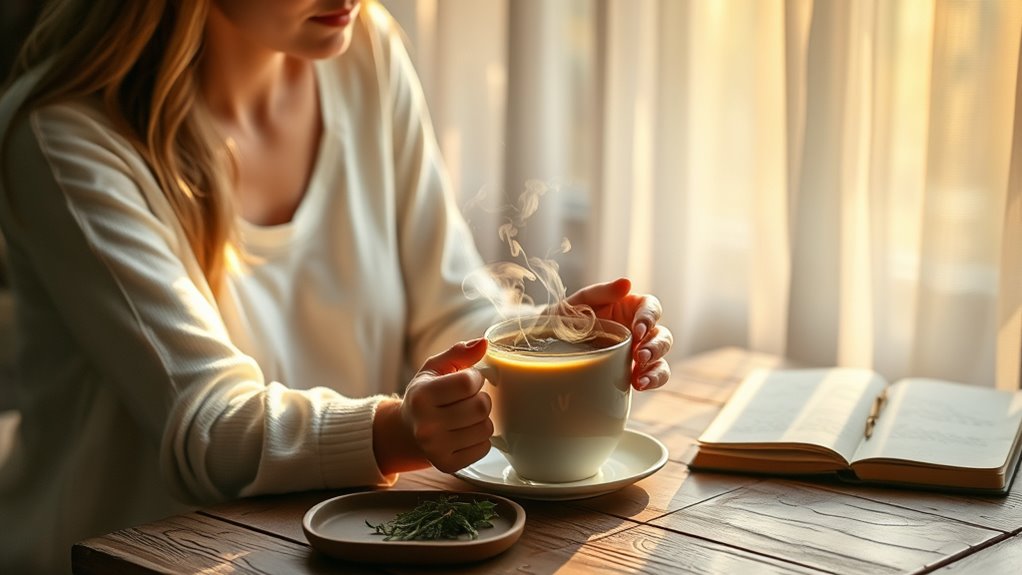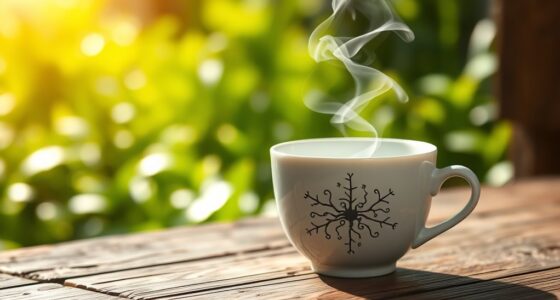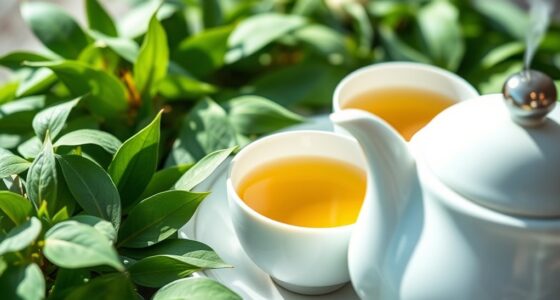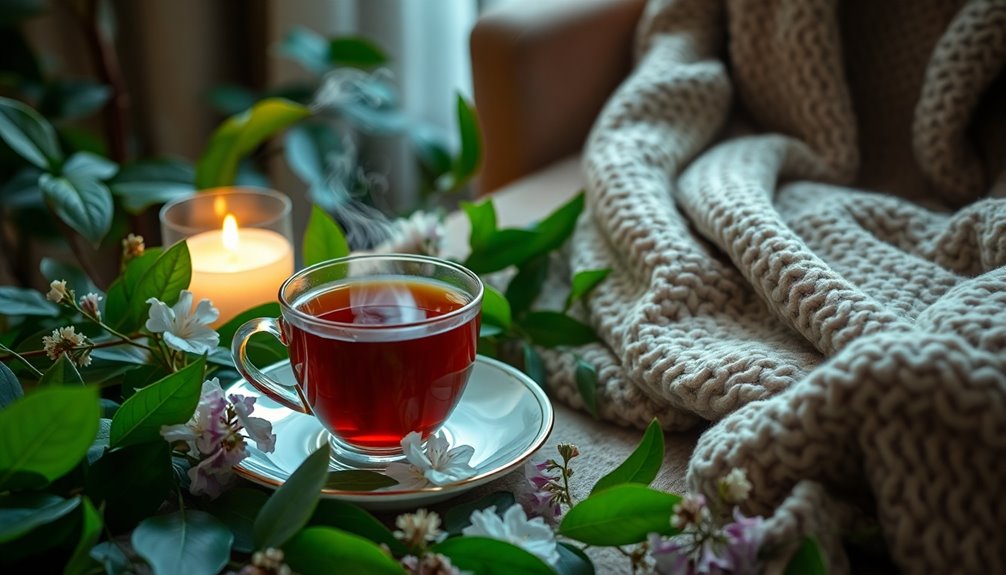Create a daily tea ritual by choosing a quiet moment each day, free from distractions. Focus on each step—smelling the leaves, pouring hot water, feeling the warmth of your cup—to stay present. Add calming scents like lavender or chamomile, and take deep breaths as you sip. Incorporating these mindful practices can help you unwind and reduce stress. Keep going, and you’ll discover simple ways to deepen your relaxation routine.
Key Takeaways
- Establish a consistent daily tea time to create a calming routine and mental reset.
- Practice mindful tea preparation by focusing on aroma, temperature, and sensory details to ground yourself in the present.
- Incorporate deep breathing and sensory focus during tea sessions to enhance relaxation and reduce stress.
- Use calming herbal teas like chamomile or lavender and add essential oils or diffused scents to deepen tranquility.
- Combine tea rituals with additional self-care, such as skincare or creating a peaceful environment, to promote overall well-being.

In today’s fast-paced world, finding simple ways to reduce stress is essential for maintaining your well-being. One effective method is establishing daily rituals centered around tea, which not only soothes your body but also nurtures your mind. Incorporating mindfulness practices during your tea time can transform a simple drink into a powerful tool for relaxation. As you prepare your tea, focus on each step—the aroma of leaves, the sound of boiling water, the warmth of the cup in your hands. This mindful attention helps ground you in the present moment, quieting racing thoughts and reducing tension. Combine this with aromatherapy techniques by choosing teas infused with calming herbs like chamomile, lavender, or lemon balm. The natural scents enhance the relaxing effect, creating a sensory experience that promotes tranquility.
Making tea a daily ritual allows you to carve out intentional moments of peace amidst a hectic schedule. As you sip, take deliberate breaths, inhaling deeply to absorb the soothing fragrances. This conscious breathing amplifies the calming benefits, helping to lower your heart rate and ease anxiety. Over time, these mindful tea sessions become a dependable anchor, giving you a pause button during stressful days. You might also experiment with aromatherapy techniques by adding essential oils to your space—perhaps diffusing lavender or bergamot while you enjoy your tea. The combined effects of scent and mindful focus deepen your relaxation, transforming a simple act into a holistic self-care practice. Additionally, skincare patches can be incorporated into your routine once your relaxation session concludes to address any skin concerns that may arise from stress or environmental factors.
Establishing this ritual doesn’t require extensive time or effort—just a few quiet moments each day. You can set aside a specific time, like morning or evening, to savor your tea intentionally. As you do, avoid distractions—leave your phone aside and focus solely on the experience. This intentional pause helps reset your mental state, making it easier to handle challenges with clarity and calm. Over days and weeks, these small rituals accumulate, creating a buffer against stress and fostering overall well-being. The key is consistency: the more often you practice mindfulness during your tea time and incorporate aromatherapy techniques, the more natural and effective they become. In a nutshell, this simple daily habit can serve as your personal sanctuary, a peaceful moment to reconnect with yourself and find balance amid life’s chaos.
Frequently Asked Questions
Can Herbal Teas Aid in Long-Term Stress Management?
Herbal teas can definitely aid in long-term stress reduction by offering calming benefits, such as reducing anxiety and promoting relaxation. The herbal tea benefits include ingredients like chamomile, lavender, and valerian root, which help soothe your mind and body over time. Incorporating these teas into your daily routine can create consistent moments of tranquility, helping you manage stress more effectively and fostering overall long-term well-being.
What Is the Best Time of Day to Drink Tea for Relaxation?
You should drink tea during morning tranquility or evening unwinding for maximum relaxation. In the morning, it helps set a calm tone for the day, while in the evening, it promotes unwinding and prepares you for restful sleep. Choose herbal teas like chamomile or lavender, which are known for their calming effects. Sipping tea at these times creates a soothing ritual that enhances your overall stress relief and relaxation.
Are There Any Health Risks Associated With Daily Tea Consumption?
Yes, there are some health risks with daily tea consumption. If you’re caffeine sensitive, drinking too much tea might cause sleep issues, jitters, or increased heart rate. Also, if you have a tea allergy, you could experience allergic reactions like skin rashes or stomach upset. To stay safe, monitor your body’s response, limit intake if needed, and consult a healthcare professional if you notice adverse effects.
How Do Different Tea Types Affect Relaxation and Stress Levels?
Different tea types influence your relaxation and stress levels through their unique compounds and flavor profiles. For example, chamomile and lavender teas promote calmness, while green tea contains L-theanine that enhances focus and relaxation. Use proper tea brewing techniques to release these benefits fully—steeping time and temperature matter. Conduct flavor profile analysis to appreciate subtle calming notes, making your tea ritual even more soothing and effective for stress relief.
Can Tea Rituals Be Combined With Meditation or Mindfulness Practices?
Did you know that combining tea rituals with mindfulness can boost relaxation? You can easily integrate tea meditation into your routine by practicing mindful brewing, paying close attention to each step, and savoring every sip. This practice helps you stay present and reduces stress. Incorporate mindful brewing into your daily ritual, focusing on sensory experiences, and enjoy the calming benefits of a peaceful tea meditation session to enhance your overall well-being.
Conclusion
Incorporating tea into your daily routine can markedly boost relaxation and reduce stress. Studies show that over 70% of tea drinkers experience calmer moods and better focus. By dedicating just a few minutes each day to your tea ritual, you create a soothing pause in your busy life. So, brew your favorite cup, take a deep breath, and enjoy these moments of calm—you deserve it. Your stress levels will thank you.










